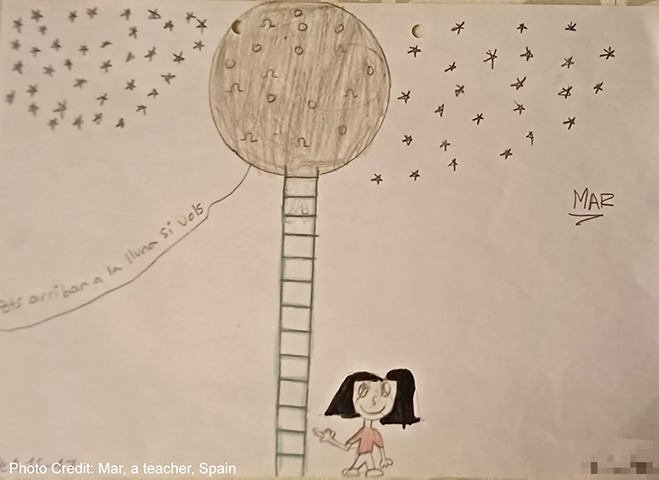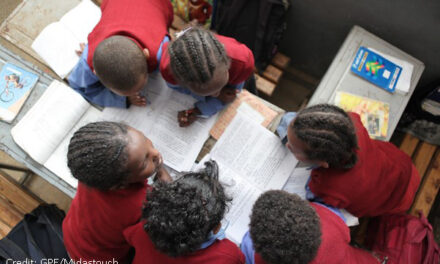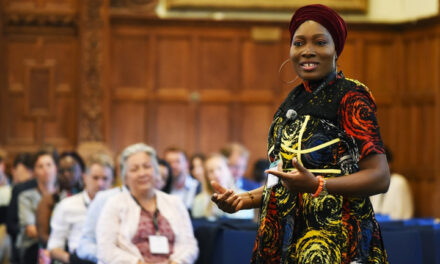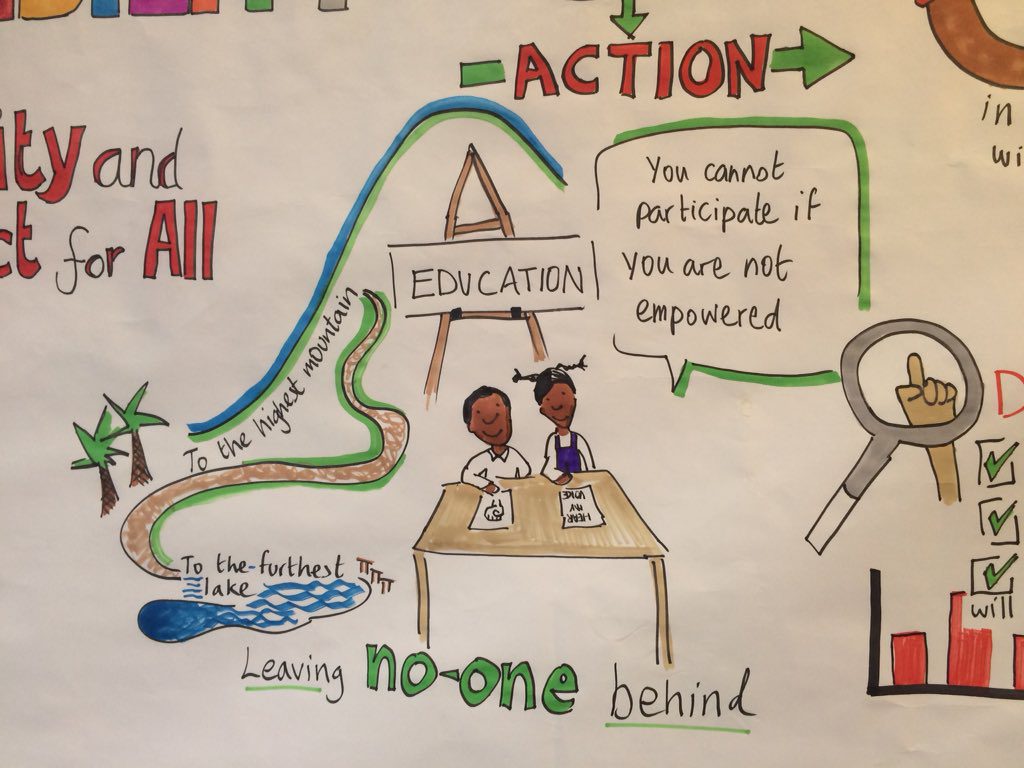This blog was written by Nidhi Singal, Professor of Disability and Inclusive Education, Faculty of Education, University of Cambridge. It highlights findings from the recent ‘Being a teacher with disabilities’ report.
Debates on inclusive education tend to overlook the need for diversity in the education workforce, particularly in relation to employment of teachers with disabilities in mainstream schools. The Education Commission’s 2019 Transforming the Education Workforce report highlighted, ‘inequities in the workforce itself are rarely recognized or addressed in the design, training, professional development, or career opportunities for the workforce’ (p.40). This is clearly the case for teachers with disabilities, as evidenced by their absence in international declarations, national policy documents and even research evidence. The first ever 2024 Global Report on Teachers, published by UNESCO and the International Task Force on Teachers for Education 2030, highlights that ‘data relating specifically to facilities and services for teachers with disabilities is extremely scarce globally’ (p.132).
However, the fact remains that teachers with disabilities are already part of the workforce – while few people might enter the profession with a disability, some acquire an impairment over their life course. Additionally, foregrounding the participation of teachers with disabilities opens new pathways of employment opportunities for persons with disabilities. This can be especially crucial in systems which are struggling with teacher shortages. Moreover, as more children with disabilities enter mainstream schools, teachers with disabilities can be vital for creating an inclusive culture, among many other things.
Findings from our recent research highlights that the discourse of inclusive education does not extend to adults in schools. Through a qualitative research approach, data were generated using semi-structured interviews and various participatory methods with 25 teachers (14 male and 11 female) with disabilities in Brazil, Rwanda, Spain, Jordan and Sri Lanka. Teacher narratives across all the five countries were not monolithic, but some overarching trends were evident. While there were some differences in views expressed due to the differentiated impact of different impairments, very little gender variation was evident across the findings.
Experiences of teachers with disabilities
Being a teacher at the periphery. A striking theme emerging from the narratives of teachers in Sri Lanka and Jordan was that of being a teacher at the periphery: being asked to teach subjects that were not considered to be of high importance, or not being given full teaching responsibilities. “I don’t have a timetable at present in my school. Now I have been in this school for seven years, seven service years”, Chaminda (Sri Lanka).
Lack of sensitivity and awareness among the school management. This was highlighted by most teachers across the five countries. School managers/head teachers were seen as complacent, expected teachers to get on with it with little support – this showed lack of trust in their abilities to be an effective teacher. These negative experiences contributed to two teachers leaving the profession.
Negative instances of little accommodations, such as not being provided accessible learning materials, were also evident when teachers spoke about their initial teacher training. These experiences were similar across types of impairments and country contexts.
Career progression. Asiri (Sri Lanka) summed it up when she responded: “There is no such a thing, actually…”. Teachers were reluctant to apply for senior level positions due to their own perceived inabilities to perform senior roles because of their disability, and more commonly, due to the lack of pathways which were open to them institutionally. Fifteen participants felt that their disability was the biggest hindrance in their inability to progress in their careers or take on leadership roles. “Some people are rejected because of disability”, Amina (Jordan).
Largely positive engagement with colleagues. Most of the teachers shared rich positive accounts of supportive colleagues. They talked about the interdependency of these relationships, how some colleagues supported them by helping them swap different roles (for example, taking on more physical active roles during sports day), while the teachers with disabilities provided a set of skills which the other teacher lacked. This was powerfully illustrated in the account of Chatura (Sri Lanka), who as a teacher of communication and mass studies, noted how he supported other teachers by helping them with technology aspects, such as printing, using the computer, etc.
Strong temporal dimension in their relationship with students. Teachers’ experiences with students in the classrooms were more mixed, with some teachers across different countries sharing experiences of being disrespected by students. However, they all spoke about how the behaviour changed once the students knew them better, over time. More strikingly, what also emerged is how teachers felt that talking about and sharing with students the nature of their disabilities and the impact it had on their functioning in the classroom was a powerful strategy. “I’m very open with them”, Pablo (Spain).
Impact on classroom teaching and learning processes
Physical and pedagogical adaptations. More than half the teachers noted having no or limited support in making pedagogical adaptations to fulfil their teaching responsibilities.
Few teachers talked about requesting physical modifications to accommodate their mobility and hearing needs, such as getting classes reallocated to the ground floor, requesting ramps and so on.
Others talked about adjustments they made in their teaching style. For example, Pablo (Brazil) talked about “assigning a lot of written work to students and gave lots of individual feedback after the class”. Sanhith (Sri Lanka), who did not have access to any of the textbooks in Braille, provided an example of how “when I describe an activity, students call out the page number”. Other teachers who had similar functional difficulties, noted that they prepared teaching and learning materials in advance of the class, such as asking someone to draw a diagram or write on a flip chart. Some teachers talked about the potential of harnessing technology, although it is important to flag that they also highlighted their own lack of training in relation to the use of different devices.
Teachers with disabilities as agents of change
Resourcefulness, resilience and advocacy. In the absence of formal support, most participants expressed a strong commitment to promoting disability inclusion through advocating for themselves, although this did take an emotional toll. As Lucia (Spain) summed up his experiences, “You always have to ask for everything. But you usually don’t get anything”.
However, these teachers were also aware of how their struggles for change could impact the lives of other people with disabilities. Teachers saw themselves as powerful role models for children with and without disabilities and were also acutely aware of how they helped change wider societal perceptions about disability. “Students are inspired by us whether or not they can identify directly”, Pablo (Spain). “What I do, it will be a motivation for them”, Mugisha (Rwanda).
Based on the very rich narratives of teachers and their own reflections on how they could be supported more effectively, the report concludes with the following recommendations.
- Develop clear recruitment policies for teachers with disabilities, including support during pre-service training
- Include mandatory professional development programmes to better prepare school leaders and mangers
- Invest in technological infrastructure to support teachers with disabilities, which will benefit all teachers (and students)
- Enable opportunities for teachers with disabilities to share experiences, learn from each other and support advocacy.
Acknowledgements:
The Being a Teacher with Disabilities report was co-authored with Drs Pui Ki Patricia Kwok and Thilanka Wijesinghe, Cambridge Network for Disability and Education Research (CaNDER), Faculty of Education, University of Cambridge
Our sincere gratitude to all the teacher participants for their time and engagement. To the British Council country office and other staff for their support in undertaking this project.





